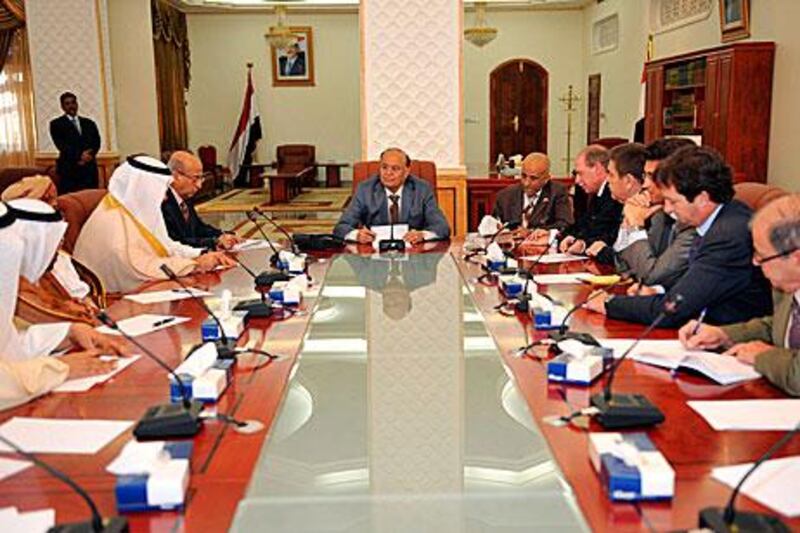SANAA AND MUSCAT // Yemen's outgoing president, Ali Abdullah Saleh, has requested permanent sanctuary in Oman as he prepares to travel to the US for medical treatment, said a foreign diplomat in Muscat.
Oman's government has not responded to the request from Mr Saleh, who gave a farewell speech to military and government leaders when he left Sanaa on Sunday, said the diplomat. He did not say when Mr Saleh will leave for the US, but it is believed he will remain in Oman for two more days.
Yemeni government officials said yesterday that Mr Saleh would return to Sanaa after his stay in the US.
A US government official said yesterday that the Yemeni leader would travel to New York this week, and probably stay in the US until no later than the end of February. The Yemeni embassy in Washington said Mr Saleh planned to return home in February to attend a swearing-in ceremony for the country's new president.
As news spread yesterday of Mr Saleh's departure, an old man stared almost nostalgically at a wall in Sanaa plastered with the ever-youthful images of the president in an assortment of regal poses. The posters of the dark-haired, moustachioed president were tattered and faded, but the fixed stares met the viewer's eyes as his gaze wandered over the collection of portraits.
"Our life was peaceful under President Saleh. He kept us safe," said Mohammed Abdul, at a pro-government campsite. "These people who wanted him to leave are liars and just want power for themselves," he said.
Mr Saleh's political career might officially be drawing to an end but, like the omnipresent illustrations, his power clings to Yemen at its highest levels. With his sons, nephews and extended family members still in charge of the army and air force, his influence is expected to continue whether or not he returns to lead his still powerful General People's Congress party, as he said he would in his farewell speech.
Next month's election of the vice president Abdrabu Mansur Hadi to officially remove Mr Saleh from office should be a memorable moment in the country's history. But after a year of protests and killings, most are unsure about the future.
"What we have now, the unity government, isn't about unity," the student activist Ruqiya Al Radayi said in Sanaa's Change Square yesterday. "The next two years before the [parliamentary] elections are just an opportunity for all the power players to improve their position and control. Will there be real change? We can only hope," she added.
Even those Yemenis who remained observers during the past tumultuous 12 months - fearful of taking sides in the upheaval that killed hundreds of protesters - admit that change is now necessary.
"I hope it will work," said Ibrahim Al Khawlani, whose family home at Kentucky junction in Sanaa was at the front line of the fighting between the two sides of the divided army last September.
"With cooperation and good intention from both sides, I am optimistic," he said as his cousin, Mohammed, and brother, Ahmed, nodded in agreement.
The fight for change that began with protests a year ago is far from over. Despite Mr Saleh signing a deal brokered by the Gulf Cooperation Council and the formation of a unity government last month, anti-government demonstrations have continued. The tented shantytown in the west of the capital is still home to thousands of activists determined to maintain their struggle for a new civil society and opposed to the GCC deal, which granted Mr Saleh immunity from prosecution.
A second wave of protests, labelled Yemen's Parallel Revolution, separate to but emboldened by the anti-government movement, broke out last month at government institutions across the country. From the police headquarters to the coastguard, workers have picketed the gates of state buildings and gone on strike at ministries, demanding the sacking of corrupt bosses.
In the latest protests, soldiers from Yemen's air force, calling for the removal of the air force chief Mohammed Saleh Al Ahmer - Mr Saleh's half-brother - continued for the second day yesterday.
A meeting at the airbase in Sanaa on Sunday ended with shots being fired after an airman threw a shoe at the senior commander. Yesterday, the mutiny spread to outside Mr Hadi's residence and to three more airbases.
Before his departure Mr Saleh apologised "for any failure that occurred" during his three-decade rule and asked for forgiveness from all his "compatriots, men and women, for any failure that occurred."
[ foreign.desk@thenational.ae ]
* With additional reporting by Associated Press





